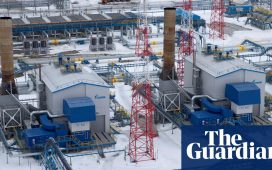A dramatic rise in European energy prices is inevitable if the Russian destruction of Ukrainian energy infrastructure continues unabated, the former chief executive of Ukraine’s state-owned oil company has warned.
Andriy Kobolyev, a former head of Naftogaz, said in an interview with the Guardian: “Russia is trying to wage a global energy war and Ukraine is part of that war and if the markets perceive that Russia is winning that war the consequences will be very serious. You will see a spike in prices all round the globe”.
He said there would be no point holding any more Ukraine reconstruction conferences until Ukraine is supplied with weapons to save its energy infrastructure from the wave of attacks by Iranian-made Shahed drones and guided bombs. “There will be no Ukrainian economy to reconstruct,” he said.
Last week a massive missile and drone attack destroyed one of Ukraine’s largest power plants and damaged others, as part of a renewed Russian campaign targeting energy infrastructure.
The Trypilska plant, which was the biggest energy supplier for the Kyiv, Cherkasy and Zhytomyr regions, was struck numerous times, destroying the transformer, turbines and generators and leaving the plant ablaze.
Kobolyev, one of Ukraine’s energy specialists and the chief executive of Naftogaz for seven years to 2021, has been fighting corruption charges in Ukraine that he claims are politically motivated.
He said the impact on energy prices of the Russian attacks would be twofold – a potential increase in Ukrainian demand for gas and electricity in Europe, and an overall market response to the likelihood that Vladimir Putin is winning the war in Ukraine. “If European energy markets start to believe Russians are winning this war it will have a dramatic negative effect on energy prices”.
Many European countries have made moves to increase their ability to import gas via liquified natural gas tankers since 2022, so analysts said the continent was not nearly as vulnerable to the war in Ukraine as it was at the beginning of Russia’s full-scale invasion. But a recent strike on Ukraine’s gas storage facilities in the west of the country caused a significant spike in European gas prices because these facilities are still operational and are still used by European gas traders. If the facilities were under Russian control – or were destroyed entirely – then traders would face a tighter supply picture.
Kobolyev also said the damage being inflicted on Ukraine’s energy networkwas far more extensive than Russian attacks in the winter of 2022-23. He said: “It looks like Russians have increased the intensity and decreased the number of targets they’re trying to hit. By being more intensive, and more focused, it has led to bigger damage.”
Unlike the first winter of attacks, when Russia targeted Ukraine’s electricity-distribution network, the recent attacks have tried to destroy large-scale generation capacity, especially gas and coal capacity used when demand goes over the baseload.
He warned: “We are going to see extensive blackouts – that is the reality and it is because we do not have access to air defences and fighter jets to combat their glide bombs.”
He said he would not reveal the absolute extent of the damage since it is militarily classified “but we are currently facing a way bigger crisis than Ukraine had a year ago. The problem is so critical for our economy that it needs solutions right now.
“The solutions are twofold. First, there should be immediate supply of air defence components and munitions to protect the system. Secondly, we need to develop a new distributed and protected generation system around the country, that should replace the destroyed balancing generation.
“So now is the time to create diversified or distributed smaller green generation in Ukraine, because there is no other option left. Many of these stations will need to be protected with concrete bunkers. It will require a new modus operandi for the west because it is going to require investment now, preferably through an agency that raises money for investment now in wartime despite the risks of military strikes.”
He dismissed US criticism of Ukraine’s attacks on Russian energy infrastructure. “To those people who dare to say that Ukraine is using drones to attack energy infrastructure on Russian territory I would reply that an energy war is being waged.”
Kobolyev is fighting charges that he paid himself a bonus that was more than the statutory maximum allowed for a state-owned enterprise employee. He said the bonus was agreed with the supervisory board after winning a massive $4.6bn arbitration award against Gazprom. An ankle tag has been removed but he has been forced to raise a large sum for bail pending the trial.
Some relatively small imports of electricity from Europe are helping to cover Ukraine’s deficit because demand is low during spring,











